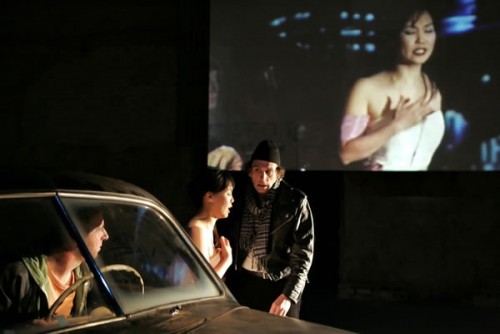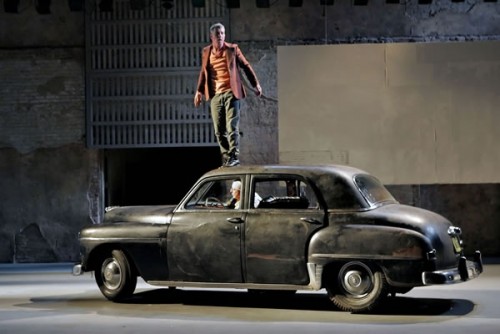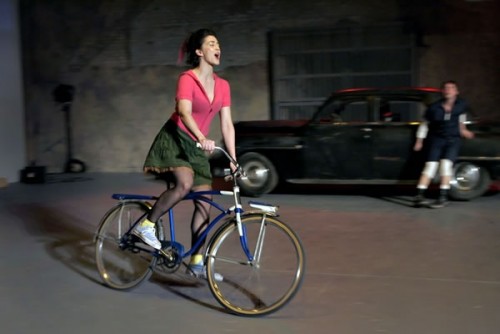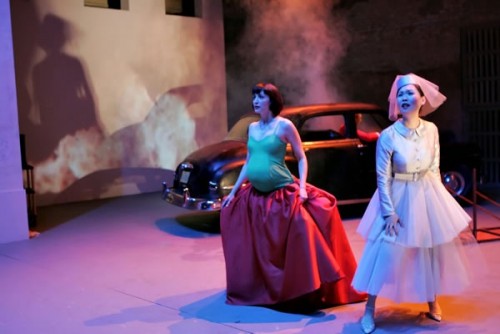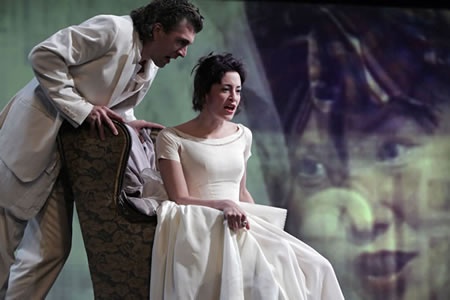American Repertory Theatre Launches Fall Season
Being Seduced by Don Juan Giovanni
By: Mark Favermann - Sep 14, 2007
Don Juan Giovanni
After Mozart, Moliere, and Beaumarchais. Directed by Dominique Serrand. In association with Theatre de la Jenue Lune. The American Repertory Theatre, Cambridge, Mass. August 31-October 6, 2007
http://www.amrep.org/
From the beginning, almost like a bewildered and somewhat hopeless Sancho Panza, Sganarelle sets the stage for Theatre de la Jeune Lune's Don Juan Giovanni at the American Repertory Theatre in Cambridge. He is an existential clown in service to the seduction master, Don Juan. The master makes himself clear from his first scene, a conversation with his long-suffering servant: "It's not about women, Sganarelle. It's not about sex." So, what is it really about? It is about a quest.
This Minneapolis troupe's most compelling opera/performance piece combines Moliere's imagination with the melodies of Mozart intertwining the two variations on a theme by having the older Don Juan and his younger twin seducer Don Giovanni on the stage often at the same time. Visually, we know that they are related because they both wear bright red shoes. Does this symbolize a pact with the devil and therefore a part of his recognizable uniform? Neither one clearly fits the stereotype of the sex-crazed mega-seducer that each name evokes. Instead, they are clearly libertines, but of an entirely eccentric nature and complexity. Each is somewhat driven by some sexual lust but more by an insatiable hunger for complete liberty, a total freedom in all its imaginable forms.
Recasting the story as an awkward road trip, the artistic director Dominique Serrand (Don Juan), uses words and music as well as characters to eccentrically shift focus creating a musically theatrical existential event. With nods and clear references to Beckett or Pirandello, the production is contemporary rather than traditional but still grounded in a classical context of the dueling Moliere play and the Mozart opera.
Like Don Quixote and Sancho Panza, the two Dons have their sidekicks as well. Sganarelle is Don Juan's comedic apologist, rifle bearer and major domo. While Leporello is Don Giovanni's bodyguard, personal assistant, and frontman, Both represent the everyman, the little guy who at times needs to be heard. While using the words of Moliere and the music of Mozart, they are still struggling to inhabit a bleakly modern existential landscape.
Dominique Serrand (Don Juan) and his longtime associate Steven Epp (Sganerelle) have reinvented the stories as a somewhat American picaresque. They ride around the stage in a 1953 Plymouth with vapid desert and glitzy Las Vegas video images. When the dynamic duos meet, they interact at a quintessentially American drive-in. On the screen is the movie Don Giovanni. A disturbing opening scene has Donna Anna fleeing from Don Giovanni. At this point, the movie on the screen and the opera intersect. When Giovanni and Leporello get in the back of the car the story takes off. Never straightforward, often just confusing, it is a meandering journey through the somewhat disorganized pieces of juxtaposed opera and play.
The voices of the singers range from extremely good to excellent. Adding to the piece, particular arias are assigned to rather unexpected singers. This works in a refreshing manner. The geeky, gawky car mechanic The extremely awkward, hickish, mechanic Peter (played by Dieter Bierbrauer), whose fiancée Charlotte has attracted Don Juan, sings "Della sua pace," lamenting his loss. This is somehow operatic without being full-blown opera.
Bryan Boyce's Don Giovanni voice seemed somewhat erratic. I don't remember Serrand's Don Juan ever singing but only talking. Neither one is a particularly forceful character. This weakens our preconception of the stereotypical predatory seducer. Both give understated performances. However, this may be actually the point of the artistic director: The issue is not sexual, lustful or gluttonous, but actually it is about the political consequences of intellectual and physical rebellion against authority. This theme certainly lessens dynamic and theatrical tension. Sex is always more interesting than politics.
Yet, this is a superbly inventive production. Christina Baldwin and Jennifer Baldwin Peden perform strongly bringing beautiful interpretations and voices to the enticing Charlotte and unjustly betrayed Elvire. Bradley Greenwald's Leporello is both charismatic and entertaining. He gives a very solid performance. Momoko Tanno is lovely as Donna Anna. Epps' neurotic Sganarelle virtually steals the show. His comic voice, timing, rubber face, and elastic body stretch and strain punctuating the narrative. Bryan Janssen's Commendatore is robust and dramatic.
Serrand's staging is minimalist, yet richly evocative. The '53 Plymouth is a character in the production by itself. Sonya Berlovitz's lovely costumes and red shoes stand out colorfully on the nearly bare stage. The music by musical director, Barbara Brooks, is wonderfully elegant ranging from gracefully and melodiously wistful, to almost symphonic. As always with ART everything included in this production is professionally first rate.
Interestingly, and ART is almost always interesting, the same performers have different roles in the weekend alternating Figaro. This production is a mélange of Beaumarchais and Mozart.
Watching Don Juan Giovanni is not easy. However, the necessary focus and intellectual and sensual awareness are very much worth the effort. Performers often do the unexpected like ride bikes, jump on top of cars, strip, and sing arias that don't quite fit their character. Don Juan Giovanni is a sometimes magical blend of an often quite beautiful musical narrative underscored by provocative visuals and props interlaced with cultural symbolism. This cutting edge opera can get quite confusing, but the confusion seems to clear up by the last aria. ART's Don Juan Giovanni is a special theatrical event. As one of the performers said to me when I complimented her on her striptease in the second act, "There is something for everyone here."

